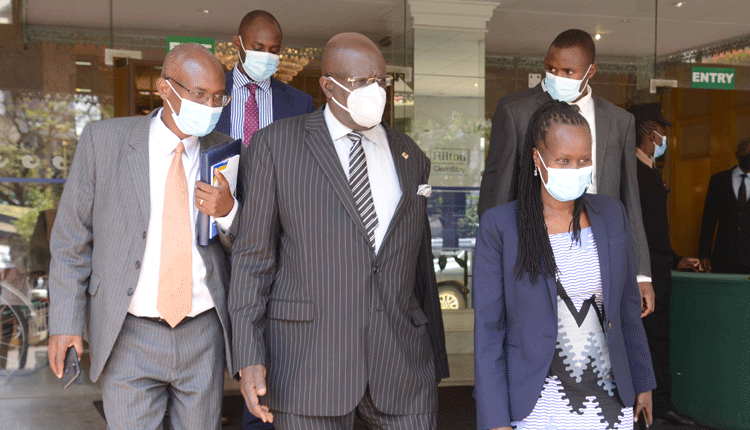Double intake strain hits educationists
By Irene Githinji, September 15, 2021The government is apparently grappling with how to deal with imminent challenges anticipated to impact on the education system by 2023, with full implementation of the Competency-Based Curriculum (CBC).
Already, educationists are warning of an unprecedented crisis in the education sector in the next two years, unless the government moves fast to address the biting issues of teachers shortage, infrastructure and budgetary allocation.
The implementation of the new system, hailed as being less exam-oriented and instead promoting skills and talent, is fraught with confusion over the criterion that would be used to peg the transition of learners from primary to both junior and senior secondary school.
Education ministry officials spoke yesterday during a meeting with the Kenya Editors Guild at a Nairobi hotel.
They talked of the enormous challenges the double intake is likely to pose on existing infrastructure, when the two classes move to secondary schools in just over a year’s time.
Choose pathways
The first cohort of Competency Based Curriculum (CBC), currently in Grade 5 will transition to junior secondary in 2023 at the same time as those in Class 7 under the 8-4-4 system now.
The main challenges, according to the ministry officials, revolve around increased demand for school infrastructure and teachers. They, however, maintained these will be addressed progressively.
“Junior secondary will be domiciled in the secondary schools hence in 2023, Grade 6 and Standard 8 learners will start their secondary education.
The transition process imposes increased demand for infrastructure and teachers,” Education Chief Administrative Secretary Sara Ruto, explained during a meeting with the Kenya Editors Guild yesterday.
One way of addressing the infrastructural challenges, according to the ministry officials, is to utilise extra facilities in some schools that are not being optimally used.
To this end, the task force recommended rationalisation of schools for maximum utilisation and sharing of infrastructure.
“Criteria for transition from primary to secondary school level is being developed.
The ministry’s policy on registration of schools allows for the establishment of different categories of schools to cater for the different levels,” Ruto said.
According to the CBC task force report, Junior Secondary School Grades 7, 8 and 9 will be domiciled in the secondary education level, where learners will deepen their understanding of the broad CBC and choose pathways and tracks to follow in senior secondary.
“It is true there are challenges. Why don’t you bring those challenges in a manner we can accept, not doing it for other issues… because if you come to me and 90 per cent of what you are saying is incorrect, even if the 10 per cent you are saying is correct, do you think I will listen to it? asked Education Cabinet Secretary (CS) George Magoha.
He said CBC is here to stay, describing it as the most transformative idea he has seen.
“I used to be worried that our teachers would compromise it, but they even love it. In the many classrooms I have been to, I am able to see learning going on.
You cannot put those children down even if you are wicked. To portray like the government is doing nothing is being unfair, do not demonise me for saying so because the facts are there,” he stated.
“We know for sure as a government that nothing is perfect and we also know that CBC is not perfect… but we also know that it left the station in 2018 even before I was appointed the CS and it is moving forward,” he added.
He assured the country that the government will do everything possible to ensure CBC is a success.
Magoha also said the question of how learners will transition to junior secondary should not even arise, explaining that it will come naturally without prejudice unlike in the 8-4-4 system where people used to “pay money in briefcases”.
He said he has been to more than 500 schools where learning is going on and dismissed a case filed to stop the CBC as uncalled for.
“Go and look at the children from Mombasa to Kilifi to Siaya to Busia, they are happy.
I am usually attracted to the poor children, I go to the slums – in the Kibera’s of this world, to know how the children are handling CBC and they are happy.
Are we right to say that you want to move to court when we already have five million children happy to engage?” he asked.
He said parents are expected to show interest in their children’s learning, encourage them and provide the basic needs as opposed to unwarranted complaints.
Pilot study
To establish the progress of CBC, the Kenya National Examination Council will conduct a pilot study in preparation of Grade 6 summative assessment from September 27 to October 1.
The purpose is to establish the suitability of assessment tools, difficulty level of items, appropriateness of language, adequacy of the duration of tests as well as reporting format for learners’ competencies.
On her part, Implementation of Curriculum Reforms Principal Secretary Fatuma Chege explained that categorisation of schools has not been taken into consideration under CBC.
“We have seen schools in low categories, which are Sub-county schools, but the learners perform very well. This is an indication that it is not about the name of the school but learning,” Chege explained.
She said all secondary schools in the country will be expected to admit children in junior secondary.
